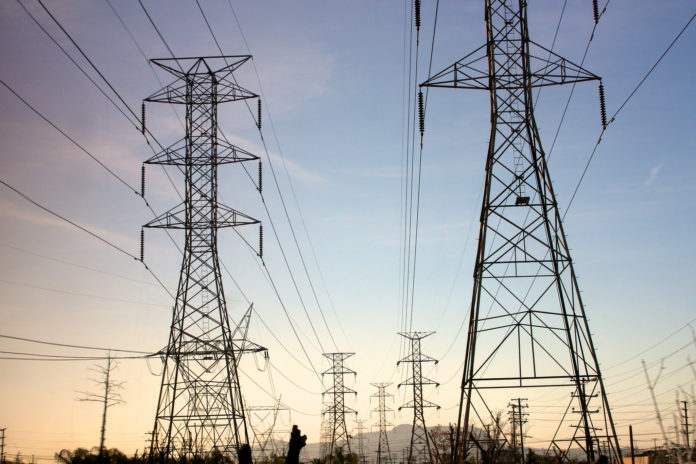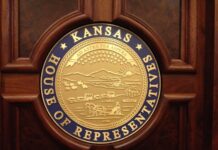State utility regulators predict that electric rates would increase under a bill pursued by Evergy that the company says will help attract investor capital needed to meet the demands of new economic development.
Staff from the Kansas Corporation Commission on Tuesday testified against the bill in its current form, but offered more mixed reviews about the legislation, objecting strenuously to parts while being more accepting of others.
The overall bill would change the regulatory framework in a way that Evergy says it can attract more investor capital so it can finance the utility infrastructure that’s in demand because of an explosion of economic development.
But Justin Grady, the KCC’s chief of revenue requirements, cost of service and finance, cautioned lawmakers that the bill could mean increases for ratepayers.
He said different parts of the bill – if applied to the last rate case decided last year – could have cost Evergy ratepayers in Kansas more than $60 million a year.
Grady said the KCC opposed the bill primarily because of how it would remove regulators’ ability to decide a capital structure for ratemaking purposes.
Grady also said that under the bill, the commission would no longer set the return on equity – the profit opportunity component of utility rates – that balances the interests of ratepayers and shareholders, and which “results in just and reasonable rates.”
He said the KCC would be required to follow the utility’s choice to use an average of the fully litigated return on equity results from other states over the last 12 months.
“To staff’s knowledge, a bill of this form that allows a regulated utility to choose its own capital structure for ratemaking purposes, regardless of how costly that decision is to ratepayers, does not exist anywhere in the United States,” he said in written testimony.
He said those sections would run counter to landmark state and federal court rulings that have held that state regulators have the authority to determine a reasonable capital structure and a reasonable return on equity when setting utility rates.
Grady’s testimony came on a bill that Evergy is seeking so it can cover the cost of capital investment needed to accommodate economic development.
The company is asking for changes it says will make Kansas more attractive to investors at a time when there’s more than $13.5 billion in investment and projects that could move to Kansas in the next five years.
“At the end of the day, this is all, for us, about enabling jobs, enabling growth and about enabling economic in the state of Kansas,” Chuck Caisley, the company’s chief customer officer, told lawmakers Tuesday.
Caisley said there is a coalition of more than 20 groups, including local and regional chambers of commerce, labor unions and developers, supporting the bill.
“They see what we see, which is the best way to keep rates low, the best way to provide jobs is to grow the economy and support the growth of the economy in Kansas,” he said.
Caisley acknowledged there are many opinions about what the bill does, but he noted that Wall Street is cool about investing capital in Kansas because of the regulatory environment.
“Some folks are going to say it’s going to raises rates significantly,” he said.
“We and the coalition supporting this bill say growth is the best way to keep rates competitive and low and steady, and that plays out in state upon state upon state across the United States,” he said.
He said the tepid outlook for Kansas among investors comes at an inopportune time.
“We have a significant and growing need for (power) generation in this state,” he said.
“At the same time when investors who would provide the capital necessary to build that generation are saying Kansas is a place you need to avoid, we have a growing need.”
Caisley has said the state is more likely to lose business prospects because it takes the utility two to four years to extend service to large manufacturers.
On Tuesday, he said the company would like to shorten that to less than two years.
He told lawmakers that the company’s growth rate in annual investment over the next five years is less than its peer utility companies.
Caisley said it could be argued that less capital investment means less upward pressure on electric rates.
“But when that capital investment enables economic growth, then what you’re doing is potentially threatening economic growth in the state, and that’s not good,” he said.
As he has done in earlier presentations to lawmakers, Caisley laid out investors’ reluctance to put their money in Kansas.
He has pointed to Wells Fargo Research recently ranked Kansas among the worst regulatory jurisdictions in the country, along with Illinois, Maine, Connecticut and Washington, D.C.
On Tuesday, analyst Sarah Akers from Wells Fargo maintained a “buy” rating on Evergy’s stock, noting the potential benefits of the bill before the Legislature.
“The potential benefits of Kansas House Bill 2527, should it pass, include provisions for enhanced recovery of gas plants and more favorable ratemaking conditions, all of which could strengthen Evergy’s financial position and support the ‘buy’ rating,” Business Insider reported Tuesday.
Among other things, the bill would:
- Allow the utility to fully recover depreciation for investments in the electrical grid and power generation at the time of a rate case. Currently, Evergy can’t recover depreciation expenses that occur between the time capital – let’s say a new plant – goes into service and the time of a rate case. The bill would allow Evergy to preserve all of the depreciation until a rate case, when it could be recovered. Depreciation still occurs, but it would be put into an account on Evergy’s books and be recovered at the next rate case.
- Allow the utility to recover interest and carrying costs for construction of a new natural gas plant through a line item added to the customer’s bill. The company says this provision would reduce the overall cost of the project and save money.
- Create a new 10-year economic development rate discount for economic development projects 25 megawatts or larger.
Kansans for Lower Electric Rates, a coalition made up of heavy power users, midsized businesses and some school districts, opposed the bill.
The group’s lobbyist, Paul Snider, called the legislation “an overreaching attempt to change foundational Kansas utility law and decimate the Kansas Corporation Commission’s ratemaking discretion that is necessary to determine just and reasonable rates…”
He challenged Evergy’s notion that the regulatory environment is discouraging outside investment.
He said the company’s earnings reports and dividends tell a different story.
“It’s all about achieving the appropriate balance,” Snider said in written testimony.
The bill “is not a balanced approach to meeting the energy needs in Kansas, one that is fair and equitable to retail ratepayers,” he said.
Caisley emphasized that the company is willing to compromise on the bill.
“We are committed to making this bill better,” he said. “We do not want to cause controversy here.”
“We want to work with all the other stakeholders and find a common path, a common ground here that all or most parties feel comfortable with is a positive step in the right direction for Kansas,” he said.















